Common Mistakes
- Page ID
- 13808
\( \newcommand{\vecs}[1]{\overset { \scriptstyle \rightharpoonup} {\mathbf{#1}} } \)
\( \newcommand{\vecd}[1]{\overset{-\!-\!\rightharpoonup}{\vphantom{a}\smash {#1}}} \)
\( \newcommand{\dsum}{\displaystyle\sum\limits} \)
\( \newcommand{\dint}{\displaystyle\int\limits} \)
\( \newcommand{\dlim}{\displaystyle\lim\limits} \)
\( \newcommand{\id}{\mathrm{id}}\) \( \newcommand{\Span}{\mathrm{span}}\)
( \newcommand{\kernel}{\mathrm{null}\,}\) \( \newcommand{\range}{\mathrm{range}\,}\)
\( \newcommand{\RealPart}{\mathrm{Re}}\) \( \newcommand{\ImaginaryPart}{\mathrm{Im}}\)
\( \newcommand{\Argument}{\mathrm{Arg}}\) \( \newcommand{\norm}[1]{\| #1 \|}\)
\( \newcommand{\inner}[2]{\langle #1, #2 \rangle}\)
\( \newcommand{\Span}{\mathrm{span}}\)
\( \newcommand{\id}{\mathrm{id}}\)
\( \newcommand{\Span}{\mathrm{span}}\)
\( \newcommand{\kernel}{\mathrm{null}\,}\)
\( \newcommand{\range}{\mathrm{range}\,}\)
\( \newcommand{\RealPart}{\mathrm{Re}}\)
\( \newcommand{\ImaginaryPart}{\mathrm{Im}}\)
\( \newcommand{\Argument}{\mathrm{Arg}}\)
\( \newcommand{\norm}[1]{\| #1 \|}\)
\( \newcommand{\inner}[2]{\langle #1, #2 \rangle}\)
\( \newcommand{\Span}{\mathrm{span}}\) \( \newcommand{\AA}{\unicode[.8,0]{x212B}}\)
\( \newcommand{\vectorA}[1]{\vec{#1}} % arrow\)
\( \newcommand{\vectorAt}[1]{\vec{\text{#1}}} % arrow\)
\( \newcommand{\vectorB}[1]{\overset { \scriptstyle \rightharpoonup} {\mathbf{#1}} } \)
\( \newcommand{\vectorC}[1]{\textbf{#1}} \)
\( \newcommand{\vectorD}[1]{\overrightarrow{#1}} \)
\( \newcommand{\vectorDt}[1]{\overrightarrow{\text{#1}}} \)
\( \newcommand{\vectE}[1]{\overset{-\!-\!\rightharpoonup}{\vphantom{a}\smash{\mathbf {#1}}}} \)
\( \newcommand{\vecs}[1]{\overset { \scriptstyle \rightharpoonup} {\mathbf{#1}} } \)
\(\newcommand{\longvect}{\overrightarrow}\)
\( \newcommand{\vecd}[1]{\overset{-\!-\!\rightharpoonup}{\vphantom{a}\smash {#1}}} \)
\(\newcommand{\avec}{\mathbf a}\) \(\newcommand{\bvec}{\mathbf b}\) \(\newcommand{\cvec}{\mathbf c}\) \(\newcommand{\dvec}{\mathbf d}\) \(\newcommand{\dtil}{\widetilde{\mathbf d}}\) \(\newcommand{\evec}{\mathbf e}\) \(\newcommand{\fvec}{\mathbf f}\) \(\newcommand{\nvec}{\mathbf n}\) \(\newcommand{\pvec}{\mathbf p}\) \(\newcommand{\qvec}{\mathbf q}\) \(\newcommand{\svec}{\mathbf s}\) \(\newcommand{\tvec}{\mathbf t}\) \(\newcommand{\uvec}{\mathbf u}\) \(\newcommand{\vvec}{\mathbf v}\) \(\newcommand{\wvec}{\mathbf w}\) \(\newcommand{\xvec}{\mathbf x}\) \(\newcommand{\yvec}{\mathbf y}\) \(\newcommand{\zvec}{\mathbf z}\) \(\newcommand{\rvec}{\mathbf r}\) \(\newcommand{\mvec}{\mathbf m}\) \(\newcommand{\zerovec}{\mathbf 0}\) \(\newcommand{\onevec}{\mathbf 1}\) \(\newcommand{\real}{\mathbb R}\) \(\newcommand{\twovec}[2]{\left[\begin{array}{r}#1 \\ #2 \end{array}\right]}\) \(\newcommand{\ctwovec}[2]{\left[\begin{array}{c}#1 \\ #2 \end{array}\right]}\) \(\newcommand{\threevec}[3]{\left[\begin{array}{r}#1 \\ #2 \\ #3 \end{array}\right]}\) \(\newcommand{\cthreevec}[3]{\left[\begin{array}{c}#1 \\ #2 \\ #3 \end{array}\right]}\) \(\newcommand{\fourvec}[4]{\left[\begin{array}{r}#1 \\ #2 \\ #3 \\ #4 \end{array}\right]}\) \(\newcommand{\cfourvec}[4]{\left[\begin{array}{c}#1 \\ #2 \\ #3 \\ #4 \end{array}\right]}\) \(\newcommand{\fivevec}[5]{\left[\begin{array}{r}#1 \\ #2 \\ #3 \\ #4 \\ #5 \\ \end{array}\right]}\) \(\newcommand{\cfivevec}[5]{\left[\begin{array}{c}#1 \\ #2 \\ #3 \\ #4 \\ #5 \\ \end{array}\right]}\) \(\newcommand{\mattwo}[4]{\left[\begin{array}{rr}#1 \amp #2 \\ #3 \amp #4 \\ \end{array}\right]}\) \(\newcommand{\laspan}[1]{\text{Span}\{#1\}}\) \(\newcommand{\bcal}{\cal B}\) \(\newcommand{\ccal}{\cal C}\) \(\newcommand{\scal}{\cal S}\) \(\newcommand{\wcal}{\cal W}\) \(\newcommand{\ecal}{\cal E}\) \(\newcommand{\coords}[2]{\left\{#1\right\}_{#2}}\) \(\newcommand{\gray}[1]{\color{gray}{#1}}\) \(\newcommand{\lgray}[1]{\color{lightgray}{#1}}\) \(\newcommand{\rank}{\operatorname{rank}}\) \(\newcommand{\row}{\text{Row}}\) \(\newcommand{\col}{\text{Col}}\) \(\renewcommand{\row}{\text{Row}}\) \(\newcommand{\nul}{\text{Nul}}\) \(\newcommand{\var}{\text{Var}}\) \(\newcommand{\corr}{\text{corr}}\) \(\newcommand{\len}[1]{\left|#1\right|}\) \(\newcommand{\bbar}{\overline{\bvec}}\) \(\newcommand{\bhat}{\widehat{\bvec}}\) \(\newcommand{\bperp}{\bvec^\perp}\) \(\newcommand{\xhat}{\widehat{\xvec}}\) \(\newcommand{\vhat}{\widehat{\vvec}}\) \(\newcommand{\uhat}{\widehat{\uvec}}\) \(\newcommand{\what}{\widehat{\wvec}}\) \(\newcommand{\Sighat}{\widehat{\Sigma}}\) \(\newcommand{\lt}{<}\) \(\newcommand{\gt}{>}\) \(\newcommand{\amp}{&}\) \(\definecolor{fillinmathshade}{gray}{0.9}\)The purpose of this page is to alert the reader to the common mistakes which might be made in simple calculations. The reader should care fully analyze each statement, making sure that they can justify the correct statement.
Answer true or false for each of the statements given below. If the statement is false, write the correct version.
Exercise \(\PageIndex{1}\)
1. \(\sqrt{(a+b)}=\sqrt{a}+\sqrt{b}\)
- Answer
-
False. Leave \(\sqrt{a+b}\) as is. It cannot be simplified any further.
Exercise \(\PageIndex{2}\)
2. \( a^{-1/2}=\displaystyle \frac{1}{a^2}\)
- Answer
-
False. \(\displaystyle{a^{-1/2} = \displaystyle \frac{1}{\sqrt{a}}}\)
Exercise \(\PageIndex{3}\)
3. \((a+b)^2=a^2+b^2\)
- Answer
-
False. \((a+b)^2 = a^2 + 2ab+b^2\)
Exercise \(\PageIndex{4}\)
4. \(-(-2)^2=4\)
- Answer
-
False. \(-(-2)^2 = -4\)
Exercise \(\PageIndex{5}\)
5. \(-3^4=81\)
- Answer
-
False. \(-3^4 = -(3^4) =-81\)
Exercise \(\PageIndex{6}\)
6. \(2^3=6\)
- Answer
-
False. \(2^3 = 8\)
Exercise \(\PageIndex{7}\)
7. \(\displaystyle \frac{a+b}{c}=\displaystyle {\frac{a}{c}+\frac{b}{c}}\)
- Answer
-
True.
Exercise \(\PageIndex{8}\)
8. \(\displaystyle \frac{c}{a+b}=\displaystyle {\frac{c}{a}+\frac{c}{b}}\)
- Answer
-
False. \(\displaystyle{\displaystyle \frac{c}{a+b}}\) cannot be simplified any further.
Exercise \(\PageIndex{9}\)
9. \(\displaystyle \frac{5h}{h(h+2)}=\displaystyle \frac{4h}{h+2}\)
- Answer
-
False. \(\displaystyle{\displaystyle \frac{5h}{h(h+2)} = \displaystyle \frac{5}{h+2}}\)
Exercise \(\PageIndex{10}\)
10.\(\displaystyle \frac{0}{3}\) is not defined.
- Answer
-
False. \(\displaystyle{\displaystyle \frac{0}{3} = 0}\)
Exercise \(\PageIndex{11}\)
11. \(\displaystyle \frac{5}{0}=0\)
- Answer
-
False. \(\displaystyle{\displaystyle \frac{5}{0}}\) is undefined.
Exercise \(\PageIndex{12}\)
12. \(\displaystyle \frac{xy}{2}=\displaystyle \frac{x}{2}\frac{y}{2}\)
- Answer
-
False. \(\displaystyle \frac{xy}{2}\) cannot be simplified any further.
Exercise \(\PageIndex{13}\)
13. \(-2x=0 \Rightarrow x=2\)
- Answer
-
False. \(x= 0\)
Exercise \(\PageIndex{14}\)
14. \(-3x=2 \Rightarrow x=2+3=5\)
- Answer
-
False. \(x= \displaystyle \frac {-2}{3}\)
Exercise \(\PageIndex{15}\)
15. \(x^2+1=0 \Rightarrow x=\pm 1\)
- Answer
-
False. \(x^2+1 = 0\) does not have any real solutions. It does have complex solutions \(x = \pm i\).
Exercise \(\PageIndex{16}\)
16. \((x-2)^2=0 \Rightarrow x=\pm 2\)
- Answer
-
False. \(x = 2\)
Exercise \(\PageIndex{17}\)
17. The solutions of the quadratic equation \(c^2+5c+6=0\) are given by \(c=\pm \sqrt{(5c-6)}\).
- Answer
-
False. Factor the quadratic \((c-5)(c+1) = 0\). Then \(c= 5, -1\).
Exercise \(\PageIndex{18}\)
18. \((c-1)(c-3)=1 \Rightarrow c-1= 1,\) or \(c-3=1\)
- Answer
-
False. This is true if \((c-1)(c-3) = 0\) (not \(1\)).
Exercise \(\PageIndex{19}\)
19. \(\displaystyle 2\left(\frac{4}{3}\right)=\frac{8}{6}\)
- Answer
-
False. \(\displaystyle{2 \cdot \displaystyle \frac{4}{3} = \displaystyle \frac{8}{3}}\)
Exercise \(\PageIndex{20}\)
20. \(\displaystyle \frac{\displaystyle\frac{1}{2}}{3}=\frac{3}{2}\)
- Answer
-
False. \(\displaystyle{ \displaystyle \frac{\displaystyle \frac{1}{2}}{3} = \displaystyle \frac{1}{6}}\)
Exercise \(\PageIndex{21}\)
21. The only solution of the quadratic equation \(x^2-2x=0\) is \(x=2\).
- Answer
-
False. \(x=0\) is also a solution.
Exercise \(\PageIndex{22}\)
22. \(\displaystyle \frac{x-1}{x+5}=0 \Rightarrow x-1=0,\) or \(x+5=0\)
- Answer
-
False. Only \(x-1=0\) (if \(x+5=0\), this would cause division by zero).
Exercise \(\PageIndex{23}\)
23. \(\displaystyle \frac{3x}{2}=\displaystyle \frac{3}{2} \,x\)
- Answer
-
True.
Exercise \(\PageIndex{24}\)
24. By factoring an expression such as \(x^2-4,\) we mean: Solve \(x^2-4=0\) which yields \(x^2=4 \Rightarrow x=\pm 2\)
- Answer
-
False. By factoring an expression such as \(x^2-4\), we mean: \(x^2-4 = (x-2)(x+2)\).
Exercise \(\PageIndex{25}\)
25. The conjugate of \(\sqrt{(x+1)}+2\) is \(\sqrt{(x-1)}-2\).
- Answer
-
False. The conjugate is \(\sqrt{x+1} -2\).
Exercise \(\PageIndex{26}\)
26. \(\left(\sqrt{(x+1)}\right)^2=(x+1)^2\)
- Answer
-
False. \((\sqrt{x+1})^2 = x+1\)
Exercise \(\PageIndex{27}\)
27. \(x-1\) is the same as \(1-x\)
- Answer
-
False. \(x-1\) is the same as \(-(1-x)\).
Exercise \(\PageIndex{28}\)
28. \(\displaystyle \frac {(x-1)(x-3)}{(3-x)}=x-1\)
- Answer
-
False. \(\displaystyle{\displaystyle \frac{(x-1)(x-3)}{3-x} =-(x-1), x \neq 3}\)
Exercise \(\PageIndex{29}\)
29. \(-x-1=-(x-1)\)
- Answer
-
False. \(-x-1 = -(x+1)\)
Exercise \(\PageIndex{30}\)
30. \(\displaystyle \frac{4x+4}{x+8}=\frac{4+4}{9}=\displaystyle \frac{8}{9}\)
- Answer
-
False. \(\displaystyle{ \displaystyle \frac{4x+4}{x+8} = \displaystyle \frac{4(x+1)}{x+8} }\), which cannot be simplified any further.
Exercise \(\PageIndex{31}\)
31. \(\displaystyle \frac{3h}{h}=2h\)
- Answer
-
False. \(\displaystyle{\displaystyle \frac{3h}{h} = 3, h\neq 0 }\)
Exercise \(\PageIndex{32}\)
32. \(-(x^2-5x+1)=-x^2-5x+1\)
- Answer
-
False. \(-(x^2-5x+1) = -x^2+5x-1\)
Exercise \(\PageIndex{33}\)
33. \(\displaystyle \frac{1}{3x}+ \displaystyle \frac{3}{7x}=\displaystyle \frac{4}{7x}\)
- Answer
-
False. \(\displaystyle{\displaystyle \frac{1}{3x} + \displaystyle \frac{3}{7x} = \displaystyle \frac{16}{21x} }\)
Exercise \(\PageIndex{34}\)
34. If \(f(x)=x^2,\) then \(f(2+h)=4+h\)
- Answer
-
False. \(f(2+h) = (2+h)^2 = 4+4h+h^2\)
Exercise \(\PageIndex{35}\)
35. The slope of the straight line which is perpendicular to the straight line \(2x-3y+11=0\) is \(3/2\).
- Answer
-
False. The slope would be \(\displaystyle \frac {-3}{2}\).
Exercise \(\PageIndex{36}\)
36. Given that \(A=(1,5)\) and \(B=(7,3),\) the midpoint of the line segment \(AB\) is the point \(M\) is given by
\[M=\left( \displaystyle \frac{1-7}{2},\displaystyle \frac{5-3}{2} \right)\]
- Answer
-
False. The midpoint would be \(M = \left ( \displaystyle \frac{1+7}{2}, \displaystyle \frac{5+3}{2} \right )\).
Exercise \(\PageIndex{37}\)
37. \(\sqrt{(4x^2+1)}=2x+1\)
- Answer
-
False. \(\sqrt{4x^2+1}\) cannot be simplified any further.
Exercise \(\PageIndex{38}\)
38. \(\sin (\cos(x))= \sin (x) \cos (x)\)
- Answer
-
False. \(\sin (\cos x)\) cannot be simplified any further.
Exercise \(\PageIndex{39}\)
39. \begin{eqnarray*}
x( \cos (x) + \sin (x)) &= & \cos (x^2)+ \sin(x^2)\\
&=& x^2 \cos + x^2 \sin\\
\end{eqnarray*}
- Answer
-
False. \(x(\cos x + \sin x) = x\cos x + x \sin x$\)
Exercise \(\PageIndex{40}\)
40. \(1- \cos (8x)=2 \sin^2 (8x)\)
- Answer
-
False. \(1-\cos (8x)\) cannot be simplified any further.
Exercise \(\PageIndex{41}\)
41. \(\tan (x^2)= \tan\,\, x^2\)
- Answer
-
False. \(\tan (x^2)\) cannot be simplified any further. Furthermore, \(\tan (x^2)\) is the composition of \(\tan (x)\) with \(x^2\). It is not the same as multiplication.
Exercise \(\PageIndex{42}\)
42. \(\sqrt{\sqrt{a}}=a\)
- Answer
-
False. \(\sqrt{\sqrt{a}} = a^{1/4}\)
Exercise \(\PageIndex{43}\)
43. \(\sqrt[3]{8^2}=\left(\sqrt[3]{8} \right)^2\)
- Answer
-
True.
Exercise \(\PageIndex{44}\)
44. \(\displaystyle \frac{\sqrt{27}}{9}=\sqrt{9}=3\)
- Answer
-
False. \(\displaystyle{ \displaystyle \frac{\sqrt{27}}{9} = \displaystyle \frac{3\sqrt{3}}{9} = \displaystyle \frac{\sqrt{3}}{3} }\)
Exercise \(\PageIndex{45}\)
45. \(a^2-1=-a\)
- Answer
-
False. This is an equation that can be solved for \(a\) but it is not true in general.
Exercise \(\PageIndex{46}\)
46. \(a^{-3/4}=\displaystyle \frac{1}{a^{4/3}}\)
- Answer
-
False. \(\displaystyle{a^{-3/4} = \displaystyle \frac{1}{a^{3/4}}}\)
Exercise \(\PageIndex{47}\)
47. \(\log ^2 x= 2 \log x\)
- Answer
-
False. \(\log_2\hspace{3mm}^2 (x) = (\log_2 x)^2\)
Exercise \(\PageIndex{48}\)
48. \(\cos^3 x=\cos x^3\)
- Answer
-
False. \(\cos^3 (x) = (\cos x)^3\)
Exercise \(\PageIndex{49}\)
49. Recall that \(\log 1=0.\) Then, \(\log(-1)=- \log 1=0.\)
- Answer
-
False. \(\log_a (b)\) where \(b\) is a negative number is always undefined. Therefore, \(\log (-1)\) is undefined.
Exercise \(\PageIndex{50}\)
50. \((x-1)^2-(y+1)^2=4\) represents a circle centered at \((1,-1)\) and having radius \(2\).
- Answer
-
False. The equation represents a hyperbola centered at \((1,-1)\).
Exercise \(\PageIndex{51}\)
51. \(y^2-3x+1=0\) is an equation of a straight line with slope \(3.\)
- Answer
-
False. \(y-3x+1=0\) is an equation of a straight line with slope equal to \(3\).
Exercise \(\PageIndex{52}\)
52. In the triangle given \(\sin \alpha =\displaystyle \frac{a}{c}\)
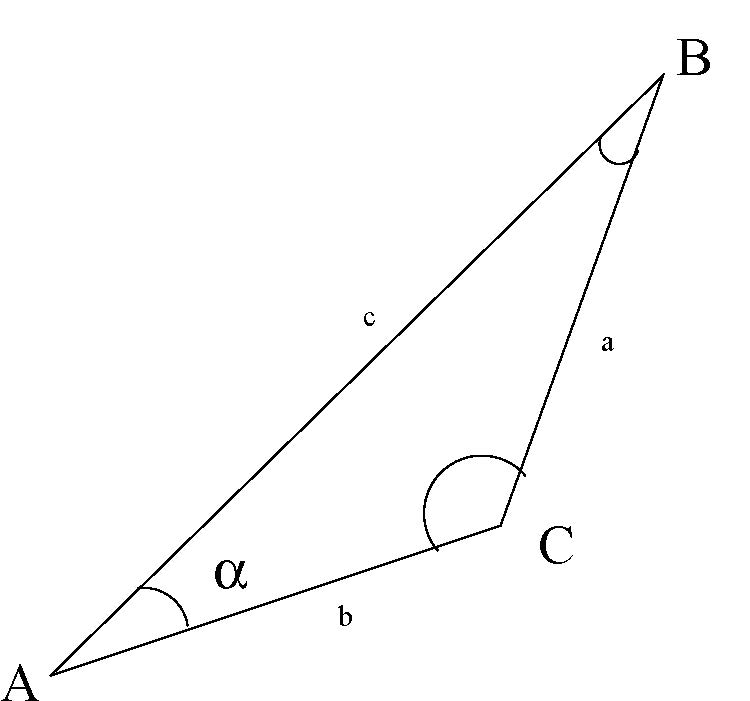
- Answer
-
False. \(\sin \alpha\) is defined for right angled triangles.
Exercise \(\PageIndex{53}\)
53. The area of the triangle is \(1/2 ab.\)
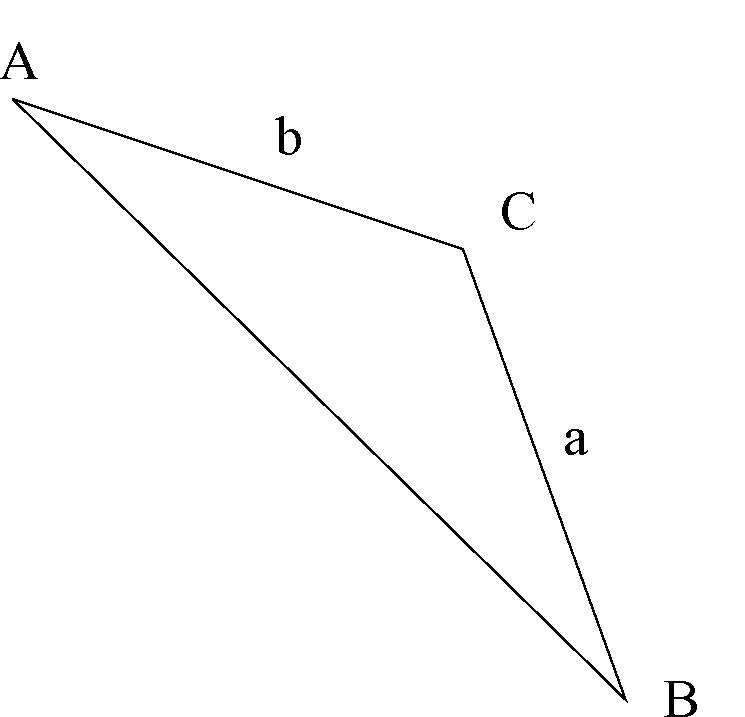
- Answer
-
False. The area of a triangle is \(\displaystyle{\displaystyle \frac{1}{2} bh}\), where \(b\) is the base and \(h\) is the height of the triangle.
Exercise \(\PageIndex{54}\)
54. Two triangles are said to be similar if and only if they have the same area.
- Answer
-
False. Two triangles are said to be similar if and only if their angles are equal.
Exercise \(\PageIndex{55}\)
55. Two triangles are said to be similar if and only if they have sides of the same length.
- Answer
-
False. See question above.
Exercise \(\PageIndex{56}\)
56. Two triangles are said to be similar if and only if their angles are equal.
- Answer
-
True.
Exercise \(\PageIndex{57}\)
57. An isoceles triangle is a triangle in which all the sides have the same length.
- Answer
-
False. An isosceles triangle is a triangle in which two sides have the same length.
Exercise \(\PageIndex{58}\)
58. An equilateral triangle must also be right angled.
- Answer
-
False. The angles of equilateral triangle are all \(60^{\circ}\).
Exercise \(\PageIndex{59}\)
59. The centre of the circle \((x-1)^2+(y+3)^2=5\) is \(c=(-1,3).\)
- Answer
-
False. The centre of the circle is \((1,-3)\).
Exercise \(\PageIndex{60}\)
60. To solve the inequality, \(\displaystyle \frac{x-1}{x} >0,\) we proceed as follows:
Multiply both sides by \(x\) to get \(x-1>0 \Rightarrow x>1\).
- Answer
-
False. To solve use a sign chart. The process described does not work because we don't know if \(x\) is positive or negative. If \(x\) is negative, then multiplication by \(x\) causes a change in the inequality.
Exercise \(\PageIndex{61}\)
61. \( \sin{\pi}=180^{\circ}\)
- Answer
-
False. \(\sin (\pi) = 0\)
Exercise \(\PageIndex{62}\)
62. If \(x=1\) then \(\sin x=\sin 1=0.17452406\).
- Answer
-
False. \(\sin (1) = 0.841470985\)
Exercise \(\PageIndex{63}\)
63. If \( \sin x= \displaystyle \frac{1}{2}\) then \( \sin x= 30^{\circ}\).
- Answer
-
True.
Exercise \(\PageIndex{64}\)
64. \(\cos(-x)= \cos x\)
- Answer
-
False. \(\cos (-x) = \cos (x)\)
Exercise \(\PageIndex{65}\)
65. On the number line shown below, the collection of real numbers represented is \([ - \infty,2).\)

- Answer
-
False. The collection is \((-\infty, 2)\).
Exercise \(\PageIndex{66}\)
66. On the number line shown above, the collection of real numbers represented is \((2, - \infty).\)
- Answer
-
False. See question above.
Exercise \(\PageIndex{67}\)
67. The interval \((-5,4]\) can be represented on the real number line as shown below.

- Answer
-
False. The interval is \([-5,4)\).
Exercise \(\PageIndex{68}\)
68. \( \sqrt[4]{x^3}=x^{4/3}\)
- Answer
-
False. \(\sqrt[4]{x^3} = x^{3/4}\)
Exercise \(\PageIndex{69}\)
69. \(\sqrt{64}= \pm 8\)
- Answer
-
False. \(\sqrt{64} = 8\)
Exercise \(\PageIndex{70}\)
70. \(\sqrt{-1}= -1\)
- Answer
-
False. \(\sqrt{-1} = i\)
Exercise \(\PageIndex{71}\)
71. \(\sqrt[3]{x^2}= x^{2/3}\)
- Answer
-
True.
Exercise \(\PageIndex{72}\)
72. The pair of straight lines \(2x+y-1=0\) and \(2y+x-1=0\) are parallel.
- Answer
-
False. The lines are neither parallel nor perpendicular.
Exercise \(\PageIndex{73}\)
73. The point of intersection of the parallel lines \( 3x+2y-1=0,\) and \(6x+4y+17=0\) is \((-1,4).\)
- Answer
-
False. There is no point of intersection of parallel lines.
Exercise \(\PageIndex{74}\)
74. The graphs of \(y=-2\) and \(x=5\) are as shown below.
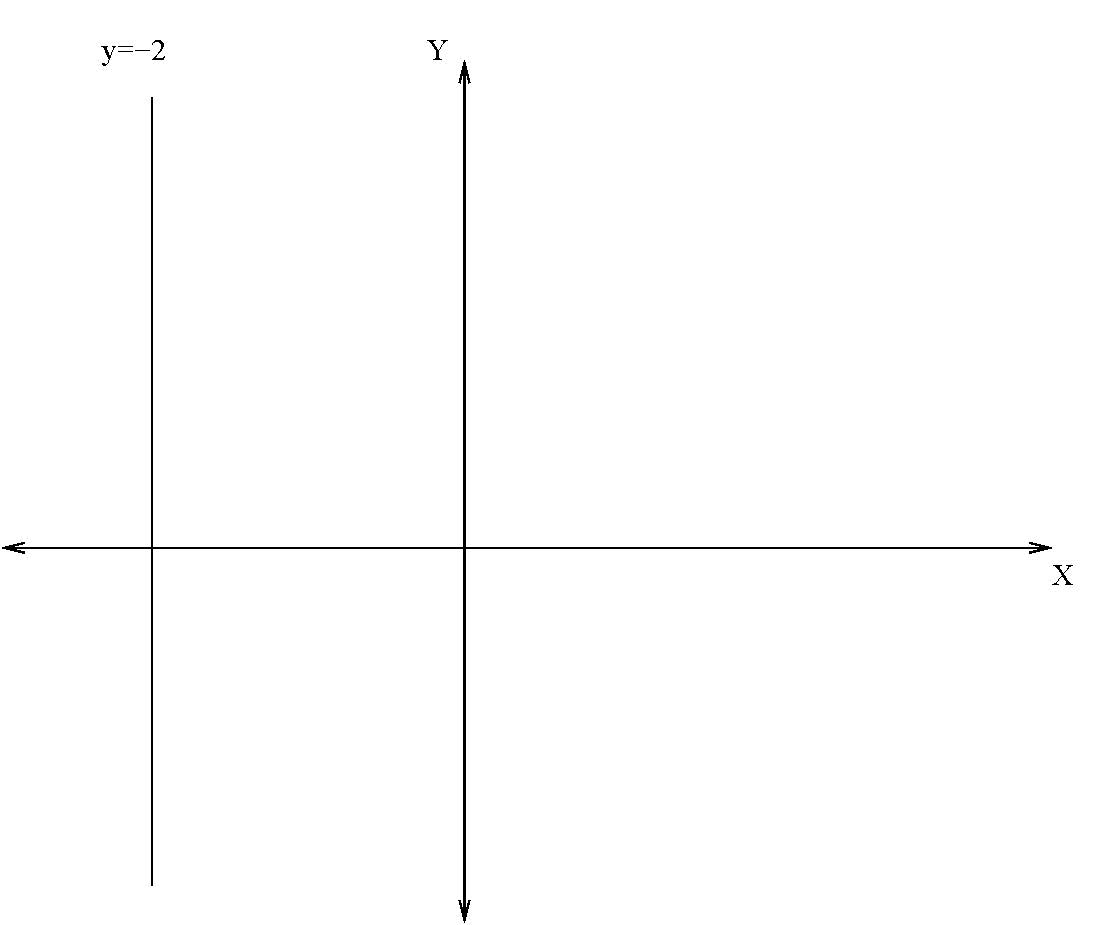
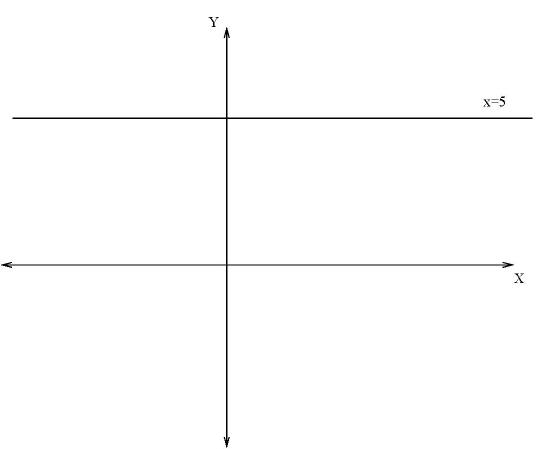
- Answer
-
False. The graphs of \(x = -2\) and \(y = 5\) are shown.
Exercise \(\PageIndex{75}\)
75. The straight line \(2x+3y=12\) has an \(x-\)intercept of \(6\) and \(y-\)intercept of \(4.\) Therefore, the line must contain the point \((6,4).\)
- Answer
-
False. The intercepts are correct but the line would contain the points \((6,0)\) and \((0,4)\).
Exercise \(\PageIndex{76}\)
76. If \(\sin x= \displaystyle \frac{3}{5},\) then \(\sec x= \displaystyle \frac{5}{3}.\)
- Answer
-
False. If \(\sin (x) = 3/5\), then \(\csc (x) = 5/3\).
Exercise \(\PageIndex{77}\)
77. \(|x^2|=-x^2\) if \(x<0.\)
- Answer
-
False. \(|x^2| = x^2\) for all \(x\).
Exercise \(\PageIndex{78}\)
78. \(|-x|=x\) if \(x<0.\)
- Answer
-
False. \(|-x| = x\) if \(x>0\).
Exercise \(\PageIndex{79}\)
79. \(|-3x|=-3x\) if \(x<0.\)
- Answer
-
True.
Exercise \(\PageIndex{80}\)
80. \(x^2y=xy^2.\)
- Answer
-
False. There is no way of fixing this.
Exercise \(\PageIndex{81}\)
81. \(\sqrt[3]{-x}\) is not defined for any real number values of \(x.\)
- Answer
-
False. \(\sqrt[3]{-x}\) is defined for all real numbers.
Exercise \(\PageIndex{82}\)
82. If \(x^3=2,\) then \(x=2^3=8.\)
- Answer
-
False. If \(x^3 = 2\), then \(x = \sqrt[3]{2}\).
Exercise \(\PageIndex{83}\)
83. If \(\sqrt[3]{x}=8,\) then \(x=\sqrt[3]{8}=2.\)
- Answer
-
False. If \(\sqrt[3]{x} = 8\), then \(x = 8^3=512\).
Exercise \(\PageIndex{84}\)
84. The equation \(\sqrt[3]{x}=-1\) has no real number solutions.
- Answer
-
False. The solution is \(x = -1\).
Exercise \(\PageIndex{85}\)
85. The graph of \(y= \cos x\) is the one shown below:
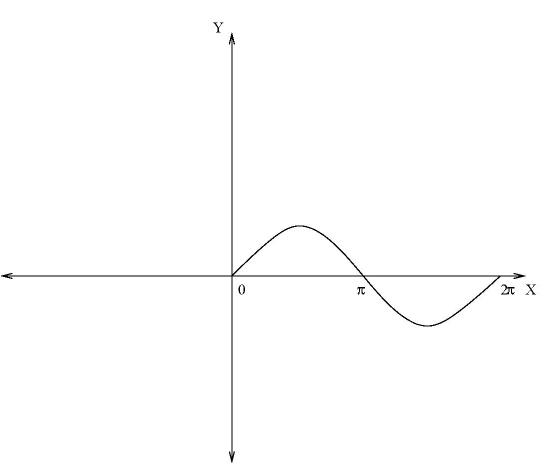
- Answer
-
False. The graph of \(y = \sin (x)\) is shown.
Exercise \(\PageIndex{86}\)
86. The inequality \(-1 \leq x \geq 2\) is valid.
- Answer
-
True. It is redundant as it is equivalent to \(x \geq -1\).
Exercise \(\PageIndex{87}\)
87. The inequality \(-1 \geq x \geq 2\) is valid.
- Answer
-
True.
Exercise \(\PageIndex{88}\)
88. The radius of the circle \(4x^2+4y^2=81\) is equal to \(9\) units.
- Answer
-
False. The radius is \(9/2\).
Exercise \(\PageIndex{89}\)
89. Every pair of straight lines is either parallel or perpendicular.
- Answer
-
False. For example, \(y = x\) and \(y = 2x\) are neither parallel nor perpendicular.
Exercise \(\PageIndex{90}\)
90. The equation of the \(x-\)axis is \(x=0.\)
- Answer
-
False. The equation of the \(x-\)axis is \(y=0\).
Exercise \(\PageIndex{91}\)
91. The equation of the \(y-\)axis is \(x=0.\)
- Answer
-
True.
Exercise \(\PageIndex{92}\)
92. \(x^2+1=(x+1)(x+1).\)
- Answer
-
False. \(x^2+1\) is not factorable.
Exercise \(\PageIndex{93}\)
93. \(x^3+1=(x^2+1)(x+1).\)
- Answer
-
False. \(x^3+1 = (x+1)(x^2-x+1)\)
Exercise \(\PageIndex{94}\)
94. \(x^4-1=(x-1)(x-1)(x-1)(x-1).\)
- Answer
-
False. \(x^4-1 = (x-1)(x+1)(x^2+1)\)
Exercise \(\PageIndex{95}\)
95. The slope of the straight line \(3y=5x-2\) is \(5.\)
- Answer
-
False. The slope is \(5/3\).
Exercise \(\PageIndex{96}\)
96. The distance between the points \((0,0)\) and \((5,5)\) is \(5\) units.
- Answer
-
False. The distance is \(5\sqrt{2}\) units.
Exercise \(\PageIndex{97}\)
97. The distance between the points \((-5,0)\) and \((5,5)\) is \(0\) units.
- Answer
-
False. The distance is \(10\) units.
Exercise \(\PageIndex{98}\)
98. The point-slope formula for the equation of a straight line may be expressed as \( x-x_1=m(y-y_1)\) where \(m\) is the slope of the straight line and the line contains the point \((x_1,y_1).\)
- Answer
-
False. The equation is \(y-y_1 - m(x-x_1)\).
Exercise \(\PageIndex{99}\)
99. \(x^2-10x-24=(x-4)(x-6)\)
- Answer
-
False. \(x^2-10x+24 = (x-4)(x-6)\)
Exercise \(\PageIndex{100}\)
100. \(x^2-10x+24=(x-12)(x+2)\)
- Answer
-
False. \(x^2-10x-24 = (x-12)(x+2)\)
Exercise \(\PageIndex{101}\)
101. If \(ax^2+bx+c=0\) then
a. \( \displaystyle x=\displaystyle \frac {\pm \sqrt{(b^2-4ac)}}{2a}\)
b. \( \displaystyle x=\displaystyle \frac {-b \pm \sqrt{(4ac-b^2)}}{2a}\)
- Answer
-
Both are false. \(\displaystyle{x = \displaystyle \frac{-b\pm\sqrt{b^2-4ac}}{2a}}\)
Exercise \(\PageIndex{102}\)
102. Question: Simplify \(\displaystyle \frac{x+1}{x-1}=\frac{x+2}{x-4}\)
Answer: by cross multiplying we get,
\begin{eqnarray*}
(x+1)(x-4) &=& (x+2)(x-1)\\
\Rightarrow x^2-3x-4 &=& x^2+x-2\\
\Rightarrow -4x &=& 2\\
\Rightarrow x=\displaystyle \frac{-1}{2}
\end{eqnarray*}
- Answer
-
False. We are asked to simplify an expression not an equation. Therefore are solution should be a fraction and not \(x =\) something. The answer is obtained by making the expression into a single expression: \(\displaystyle{\displaystyle \frac{(x+1)(x+2)}{(x-1)(x-4)}}\).
Exercise \(\PageIndex{103}\)
103. If \(\displaystyle \frac{x+1}{x-1}=0\) then \((x-1)=0(x^2+3)\Rightarrow x-1=x^2+3\)
- Answer
-
False. If we have \(x-1 = 0 \cdot (x^2+3)\), then \(x-1 = 0\).
Exercise \(\PageIndex{104}\)
104. If \(\log_2x=5\) then one of the following is true:
a. \(x=5^2\)
b. \(x^2=5\)
c. \(5^x=2\)
d. \(x=2^5\)
e. \(2^x=5\)
f. None of the above.
- Answer
-
d. is true.
Exercise \(\PageIndex{105}\)
105. If \(f(x)=\displaystyle \frac{x^2-4}{x-2}\) then \(f(2)=\displaystyle \frac{4-4}{2-2}=\displaystyle \frac{0}{0}=1.\)
- Answer
-
False. \(f(2)\) is undefined because of division by zero.
Exercise \(\PageIndex{106}\)
106. \(\displaystyle \frac{2}{x}+\displaystyle \frac{5}{y}=\displaystyle \frac{2y+5x}{x+y}\)
- Answer
-
True.
Exercise \(\PageIndex{107}\)
107. To sketch a straight line, you need at least three points which lie on the straight line.
- Answer
-
False. To sketch a straight line you need two points.
Exercise \(\PageIndex{108}\)
108. A circle is completely determined if its centre and radius are known.
- Answer
-
True.
Exercise \(\PageIndex{109}\)
109. \( \sqrt{-x}\) is undefined because of the negative sign.
- Answer
-
False. \(\sqrt{-x}\) is defined if \(x<0\).
Exercise \(\PageIndex{110}\)
110. \(\log (xy)= (\log x) (\log y)\)
- Answer
-
False. \(\log(xy) = \log (x) + \log (y)\)
Exercise \(\PageIndex{111}\)
111. \(3^0=0\)
- Answer
-
False. \(3^0 = 1\)


